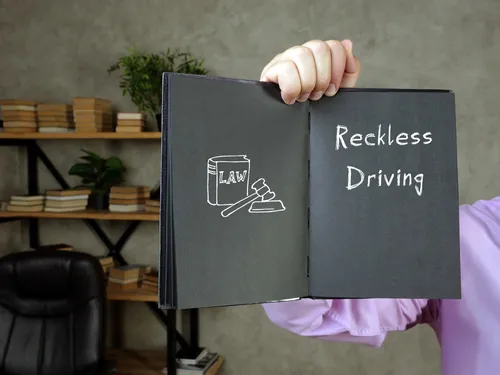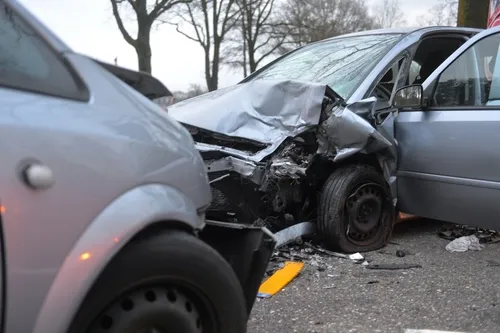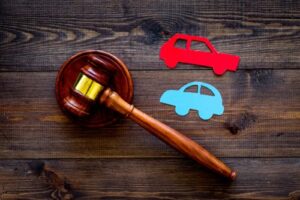Reckless driving is a serious offense in Georgia that puts countless lives at risk on our roads every day. Our experienced Atlanta car accident attorneys have seen firsthand the devastating consequences of reckless driving accidents. Our team is dedicated to helping car crash victims across the Peach State seek justice and fair compensation for their injuries and losses.
Contact us today for a free consultation.
What Is Reckless Driving in Georgia?
Under Georgia law, specifically O.C.G.A. §40-6-390, reckless driving is defined as operating any vehicle “in reckless disregard for the safety of persons or property.” This broad definition gives law enforcement and prosecutors considerable discretion in determining what behaviors qualify as reckless driving.
The key element of reckless driving is the driver’s disregard for safety. This means that the driver knowingly engages in behavior that puts others at risk, showing a clear indifference to the potential consequences of their actions. It’s important to note that reckless driving goes beyond mere negligence or carelessness – it involves a conscious decision to drive in a manner that endangers others.
Common Examples of Reckless Driving
Reckless driving can manifest in various ways on Georgia roads. Some of the most common examples include:
- Excessive Speeding: Driving significantly over the speed limit, especially in areas with heavy traffic or pedestrians.
- Aggressive Driving: This includes tailgating, weaving through traffic, and making sudden or unsafe lane changes.
- Ignoring Traffic Signals: Running red lights or stop signs shows a blatant disregard for safety.
- Racing: Engaging in street racing or drag racing with other vehicles is extremely dangerous and illegal.
- Unsafe Passing: This includes passing on blind curves, over double yellow lines, or on the shoulder of the road.
- Driving Under the Influence: While DUI is a separate offense, it can also be considered reckless driving.
- Distracted Driving: Texting or using a phone while driving is often categorized as distracted driving. Cases may be charged as reckless driving.
- Failure to Yield: This includes not yielding to emergency vehicles or school buses with flashing lights.
- Driving a Vehicle with Known Mechanical Issues: Operating a vehicle with serious technical flaws that could lead to loss of control.
- Not Adapting to Weather Conditions: Driving too fast for conditions during bad weather such as heavy rain or fog.
It’s crucial to understand that this list is not exhaustive. Any behavior that demonstrates a clear disregard for the safety of others on the road could potentially be classified as reckless driving in Georgia.
Penalties for Reckless Drivers in Georgia
Reckless driving is considered a serious offense in Georgia, classified as a misdemeanor. The penalties can be severe and have long-lasting consequences:
- Fines: A conviction for reckless driving can result in fines of up to $1,000.
- Jail Time: Reckless drivers may face up to 12 months in jail.
- License Points: A reckless driving conviction adds 4 points to the driver’s license.
- License Suspension: For drivers under 21, a reckless driving conviction results in automatic license suspension.
- Additional Penalties: The court may impose other conditions such as community service or completion of a defensive driving course.
- Higher Insurance Rates: A reckless driving conviction often leads to significantly higher auto insurance premiums.
As a misdemeanor offense, a reckless driving conviction will appear on the individual’s criminal record
It’s important to note that punishment can be more severe if the reckless driving results in injury or death. In such cases, the charge may be elevated to vehicular homicide, which is a felony offense carrying much harsher penalties, including substantial prison time.
The Impact of Reckless Driving Accidents
Reckless driving accidents often result in more severe injuries and property damage compared to other types of car accidents due to the high-risk behaviors involved. Victims of these accidents may suffer:
- Traumatic brain injuries
- Spinal cord injuries
- Severe fractures
- Internal organ damage
- Psychological trauma
These injuries can lead to long-term or permanent disabilities, requiring extensive medical treatment and rehabilitation. The financial burden of medical bills, lost wages, and property damage can be overwhelming for victims and their families.
Victims of reckless driving crashes can seek compensation for:
- Medical expenses
- Lost income
- Pain and suffering
- Property damage
In cases of severe negligence, Georgia courts may award punitive damages to car accident victims. Examples include drunk driving accidents and motorists driving far above the speed limit.
How a Lawyer Can Help Reckless Driving Accident Victims
If you’ve been injured in an accident caused by a reckless driver, the Weinstein Firm can provide crucial assistance in several ways:
Gathering Evidence
Our team will conduct a thorough investigation of the accident, gathering evidence to prove the other driver’s reckless behavior. This may include obtaining police reports, interviewing witnesses, and analyzing traffic camera footage.
We will work to clearly establish the reckless driver’s liability for your injuries and damages. This is crucial for your insurance claim and any potential lawsuit.
Calculating Damages
We’ll help you understand the full extent of your damages, including current and future medical expenses, lost wages, pain and suffering, and any long-term care needs.
Negotiating Settlements with Insurance Companies
Our experienced attorneys will handle all communications with insurance companies, protecting your rights and ensuring you’re not pressured into accepting an unfair settlement. We know the tactics insurance companies use to delay claims and minimize payouts, and we will fight to protect your interests.
Our skilled lawyers will work to secure a car accident settlement that fully compensates you for your losses. If a fair settlement can’t be reached, we’re prepared to take your case to trial.
Representing You in Court
If your case goes to trial, our experienced car accident attorneys will vigorously represent your interests in court, presenting a compelling case to the judge and jury.
There are strict deadlines for filing personal injury claims in Georgia. We’ll ensure all necessary documents are filed on time to protect your right to compensation.
How Long Do You Have to File a Car Accident Lawsuit?
Georgia law sets a deadline for filing a car accident lawsuit known as the statute of limitations. Car accident victims normally have two years from the accident date to file a personal injury lawsuit. There are exceptions to this time limit, such as if the injured person is a minor.
If you wait too long, you’ll lose the chance to recover compensation. It’s important to contact a car accident lawyer as soon as possible to build a strong case.
Preventing Reckless Driving
While we’re here to help victims of reckless driving accidents, we also believe in the importance of prevention. Here are some tips to avoid reckless driving:
- Always obey traffic laws and speed limits.
- Never drive under the influence of alcohol or drugs.
- Avoid distractions while driving, such as using your phone.
- Practice patience and courtesy on the road.
- Ensure your vehicle is properly maintained.
- Adjust your driving to weather and road conditions.
By following these guidelines, we can all contribute to making Georgia’s roads safer for everyone.
Why Choose the Weinstein Firm?
Victims of reckless driving accidents often face significant challenges in their recovery. Medical bills can quickly pile up, and many car accident victims are unable to work for extended periods. Insurance companies may try to minimize payouts, leaving victims struggling to cover their expenses.
By working with the experienced Atlanta car accident attorneys at the Weinstein Firm, you can focus on your recovery while we handle the legal aspects of your case. We have a proven track record of recovering millions for car accident victims across Georgia and we’re committed to fighting for the full compensation you deserve.
Contact Our Car Accident Lawyers for a Free Case Review
If you or a loved one has been injured in a reckless driving accident in Atlanta or anywhere in Georgia, don’t hesitate to reach out to the Weinstein Firm. Our experienced car accident attorneys are ready to fight for your rights and help you secure the compensation you deserve. We offer free consultations, and we don’t charge any fees unless we win your case.
Remember, reckless driving is not just a traffic violation – it’s a serious offense that can have life-altering consequences. If you’ve been a victim, you don’t have to face the aftermath alone. Contact the Weinstein Firm today, and let us help you on your path to justice and recovery.






